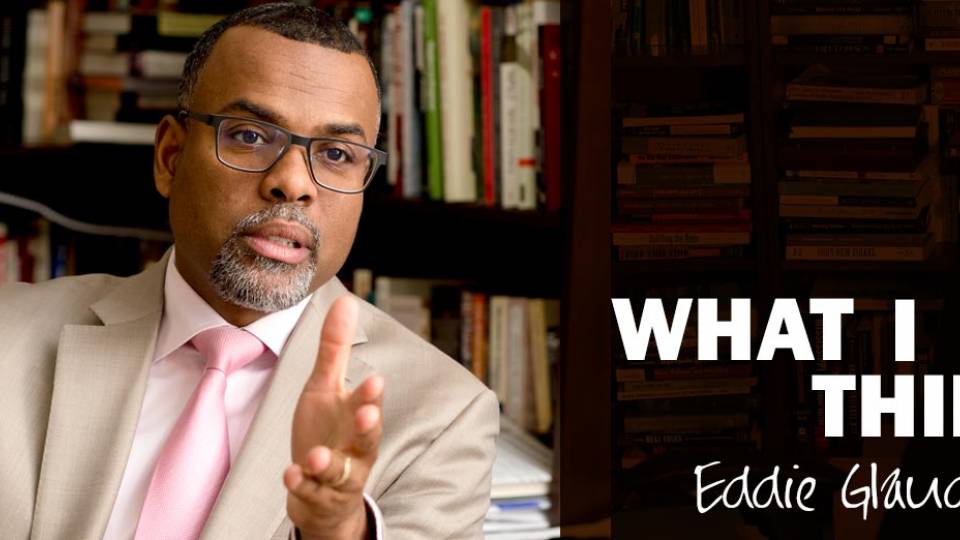The new home for Princeton University's Center for African American studies was dedicated Oct. 2, 2007
Valerie Smith: I'm Valerie Smith, Woodrow Wilson Professor of Literature and Director of the Center for African American studies at Princeton, and I'm delighted to welcome you to our new home in Stanhope Hall.
Our location in Stanhope Hall gives us for the first time an entirely dedicated space designed to foster intellectual exchange for scholars, faculty, students who are committed to and interested in the study of race.
Shirley M. Tilghman: I will tell you that there is an enormous amount of joy in my heart right now. This is a moment that I think many of us at Princeton have been thinking about, planning about, dreaming about for many, many years. All I can say is, "Hold on to your seats." This is going to be a really exciting ride for the future of African American studies at Princeton University.
Roger Mason: My name is Roger Q. Mason and I stand before you on these steps as a proud senior concentrator within the Center for African American studies of Princeton University. Words cannot fully express how enthusiastically I anticipate the academic and cultural possibilities that this building and the people within it will bring to Princeton University and to this wonderful town.
Eddie Glaude: It's a historic occasion. It's a wonderful day not only for Princeton, but for the field of African American studies across the United States.
I come out of a blues people who in some significant way never believed the idea that America was an example of Democracy achieved. That these folk who had been denied access to all of the benefits and resources of American life would dare tell themselves a story. That they would not succumb to the temptations of doubt, despair and hate. That they would love themselves in such a way, and love this nation in such a way, that they would provide an opportunity for their children to actualize their dreams. And so here we have African American Studies, right. This field of inquiry that merges in interesting sort of ways, out of this struggle, right. Out of this effort. And we have Princeton University committing itself to supporting this field and understanding its centrality to an American education. What a glorious day, what a glorious moment.
Joshua Guild: In some ways African American studies exemplifies the best of a liberal arts education. It really talks about the human condition in a very fundamental way. And the interdisciplinary nature of African American Studies, I think, is essential to what we're trying to do, but is essential to the kind of education that Princeton promotes. There's a long history of African American studies on this campus and going back to the late 1960s, but this really signals a new time period, a new generation of scholarship, a new generation of student involvement and, we hope, a broader reach of African American studies throughout the campus.
Valerie Smith: It's so important, I think, to keep in mind that the fact that we are even in this building has everything to with the student commitment to the significance of African American Studies. Almost 30 years ago, the students who decided that they needed to take a stand to ensure that Princeton made African American studies available to them and to subsequent generations.
Coming Back and Looking Forward Conference for Black Princeton Alumni
September 2006
Cornel West: We're at a moment now where Princeton is a caretaker of treasures that the world must take notice of. And we must have black voices in that context as part of that treasure, you see. Not because it's black, but because through Socratic dialogue. And through a deep commitment to justice it may be able to leave the world just a little better than we found it.
Christopher Eisgruber: This is a vision that integrates African American studies into the core of a liberal arts education for all of our students. And I think it is consistent with the best of the ideals of this university and I think it is distinctive in the way that African American studies has been approached around this country. And we are proud to be launching an initiative of that kind.
Badi Foster: The race for justice is a relay race. I was fortunate to run in the first leg, but so many of you ran in the second leg, and the third leg, and it's not over. People of goodwill ultimately will say, "How may I be of service to you to advance the humanity and the understanding a diverse community?"
[music plays]
Credits
A production of Princeton University Office of Communications
Direction & Cinematography:
Evelyn Tu & Denise Applewhite
Editing:
Evelyn Tu
Speakers:
Valerie Smith
Shirley M. Tilghman
Roger Mason
Eddie Glaude
Joshua Guild
Cornel West
Christopher Eisgruber
Badi Foster
Music:
Piano: Dan Berry, Class of 2009
Saxophone: R. W. Enoch, Class of 2009
Bass: Theo Beers, Class of 2009
Drums: Tyler Pines, Class of 2009
Special thanks to:
Carla Hailey Penn
Sebastian Jones
Additional footage: Melvin McCray '74
Archive photo: Robert Matthews
©2007 The Trustees of Princeton University



